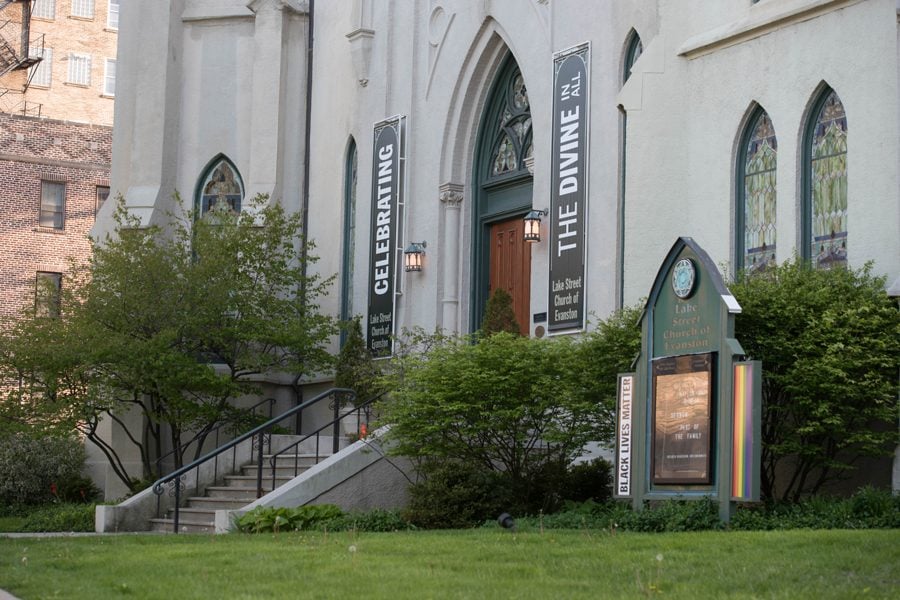Lake Street Church’s relief fund combats effects of COVID-19, racism
Daily file photo by Alison Albelda
Lake Street Church, 607 Lake St. Lake Street Church, led by Woolf, raised $6000 to help black families with rent and groceries.
September 17, 2020
To combat growing eviction rates and food insecurity, Lake Street Church opened a COVID-19 relief fund for black Evanston residents in August.
Lake Street Church raised $6,000 through congregant contributions and a grant from American Baptist Home Mission Societies. The church received enough applicants in the first 24 hours to distribute all of the money, and was able to provide 15 Evanston residents with checks of up to $500 to help with rent and groceries.
Reverend Michael Woolf, a senior minister at Lake Street Church, said applicants had to fill out a Google Form asking for their name, address and race to be eligible to receive the money. The form, Woolf said, didn’t ask about applicants’ income or specific needs.
“We don’t want to see your lease — we don’t care about screening that way,” Woolf said. “We rely on people who are good and need help.”
Woolf said some members of the Evanston community expressed frustration because the fund only benefitted black residents. But Woolf said it was important for the church to help the city’s black community, which has been disproportionately impacted by COVID-19.
While black residents only make up 16 percent of the Evanston population, they currently comprise about 27 percent of the city’s COVID-19 cases, according to the Illinois Department of Public Health. Yet, of the $4 million in grants the city received for pandemic response funds, an August city press release did not specify any grants designated for the black community.
Though working with a much smaller fund than the city, Woolf said the church designed the fund to target both need and racial equity.
“It was really our conviction that it’s not that institutions just need to be sort of race-blind or not care about the races, but that they need to be anti-racist,” Woolf said.
Lake Street Church’s commitment to social justice extends beyond the COVID-19 relief fund, according to their website. The church currently houses an immigrant family seeking asylum, works with the Interfaith Community for Detained Immigrants and partners with the historically black Second Baptist Church, among other efforts.
Reverend Michael Nabors, the pastor of Second Baptist Church, collaborated with Woolf on the fund and nominated some of his congregants as possible recipients. He said COVID-19 has disproportionately impacted senior citizens and those with pre-existing conditions at Second Baptist Church.
“I think it’s going to get worse before it gets better,” Nabors said.
Eloina Menzies, a recipient of the fund, said the money helped her buy groceries for herself and her six children. Menzies said the money relieved some of the financial pressure of her tuition at Oakton Community College, where she studies early childhood education.
Theresa, an Evanston resident who asked The Daily to only use her first name for privacy reasons, said she felt she couldn’t keep up with her rent payments. She said the money from the fund is helping her “look forward and not think about owing something,” reducing some stress.
Woolf said the fund was limited, and the form closed before many people could apply. Still, he said he hopes the fund will push his congregants and the broader communities of faith to care for the black community more tangibly.
“If every church in Evanston or if every institution gave that sort of money, it would be quite the fund,” Woolf said. “We wanted to show that it was easy.”
Email: [email protected]
Twitter: @EricaCDavis1
Related Stories:
— The myth of the ‘great equalizer’: Preliminary data show black Evanston residents contract virus at higher rates
— Pritzker announces $900 million COVID-19 relief grant package


